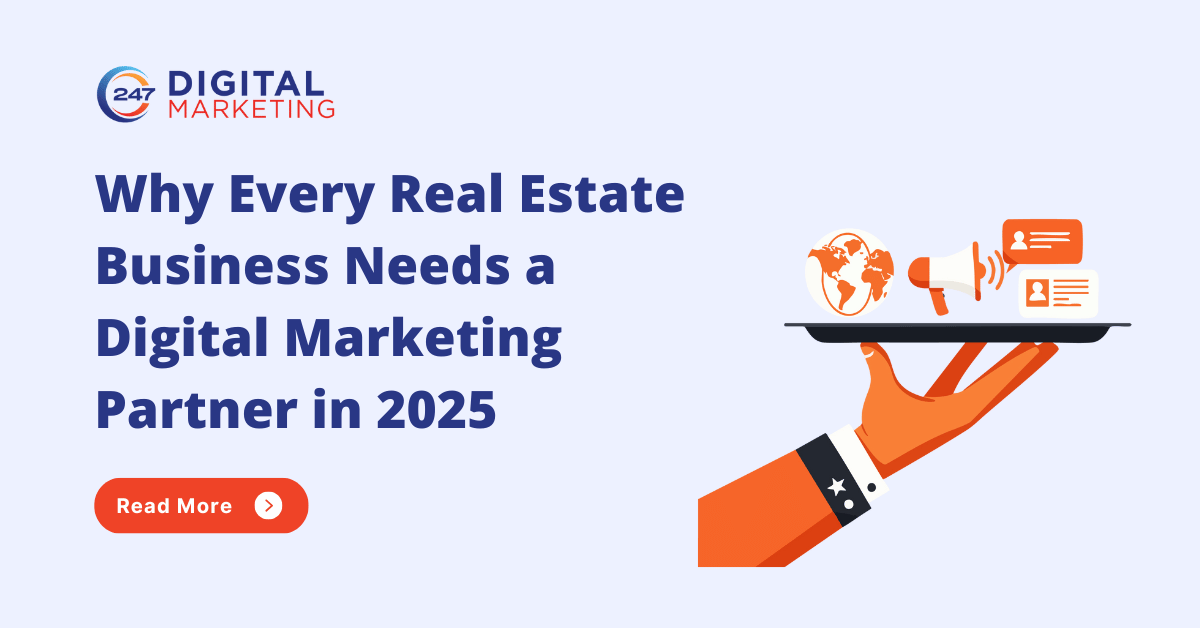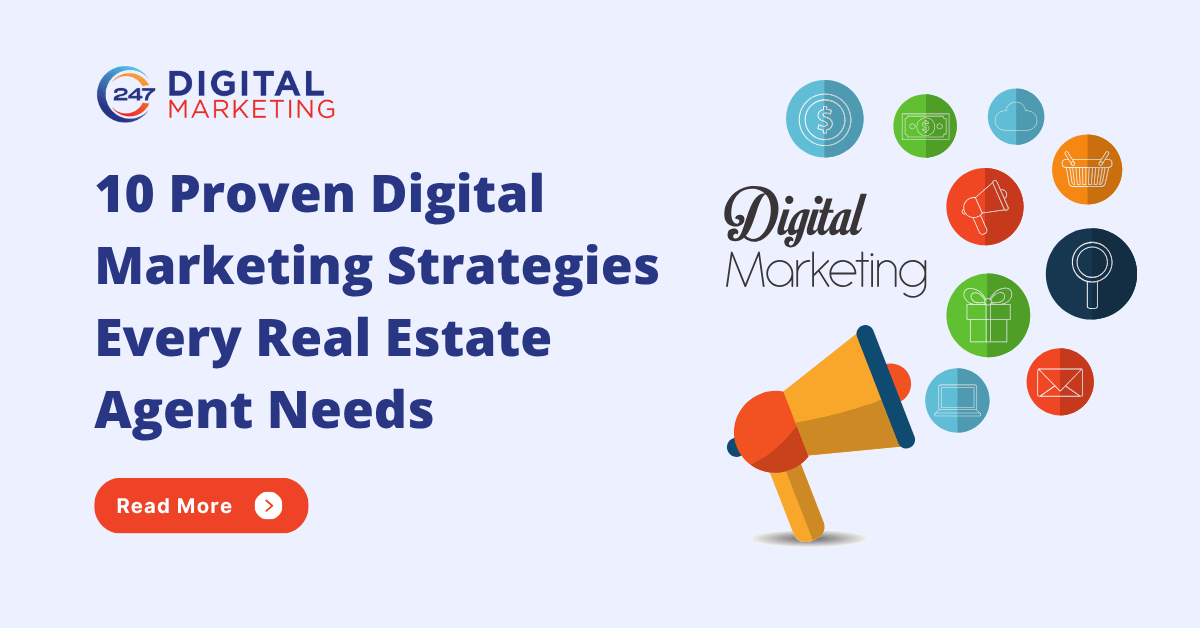Why Every Real Estate Business Needs a Digital Marketing Partner in 2025

If you’ve felt that real estate marketing changed faster in the last two years than in the previous ten, you’re not imagining it. Buyers are researching neighborhoods on their phones during coffee breaks, binge‑watching 30‑second property reels at night, and asking voice assistants which areas have the best schools before they ever speak to an agent. Meanwhile, sellers expect professional photography, virtual tours, and a Google search presence that makes them feel confident you can command attention for their home. In this climate, a digital marketing partner isn’t a “nice to have” , it’s the quiet engine that keeps your pipeline full and your brand trusted.
The reality on the ground
Think about the last time a stranger called you out of the blue and you eagerly answered. Exactly. Today’s buyers and sellers prefer to engage on their terms: they click, scroll, skim, and only then raise a hand. That’s why so many top‑performing teams now treat their website like a flagship store, their Google Business Profile as the storefront sign, and social video as the window display that stops people in their tracks. When each of those touchpoints is orchestrated by specialists, you feel it in lead quality, appointment volume, and how often prospects say, “I see you everywhere.”
What a great partner actually does (beyond buzzwords)
A strong agency doesn’t drown you in acronyms; it translates them into outcomes. Here’s what that looks like in real life:
- Audience clarity, not guesswork. They start by mapping your true demand: the neighborhoods you own, the price brackets that convert, and the client questions that come up again and again. Out of that, they build an editorial calendar of hyper‑local guides, listing spotlights, and “how to” pieces that answer real search intent.
- Search that compounds. With the Best Real Estate SEO Services, they tidy the technical foundations (site speed, schema, mobile experience), then publish useful content that earns search placement for the long haul. Instead of chasing vanity traffic, they target terms that attract buyers and sellers ready to move.
- Paid media that pays back. A seasoned Real Estate PPC Agency won’t waste your budget on broad, expensive clicks. They build smart audiences who visited your listings, watched your videos, or live within specific school zones and write ads that match intent. The result: fewer “curious clicks,” more qualified calls.
- Video with purpose. Short‑form walkthroughs and neighborhood “day in the life” clips are edited for the platforms your clients actually use. Each video has a job: stop the scroll, answer a question, and create a clear path to book a viewing or valuation.
- Reputation that snowballs. They help you earn and showcase fresh reviews (and respond to the occasional tough one with grace), then mark up testimonials so search engines understand they’re real. Over time, that credibility feeds both rankings and conversions.
- Measurement you can act on. Dashboards show not just “traffic,” but which pages, ads, and videos actually generated consultations, so you can double down where returns are real.
A quick story from the field
A three‑agent boutique brokerage I worked with had a common problem: plenty of impressions, few conversations. Their site looked fine, but it loaded slowly on mobile and their content tried to please everyone. We rebuilt with speed and clarity in mind, focused on three neighborhoods they knew intimately, and rolled out a cadence of one weekly article (“Should you buy near the new metro line?”), one short video (a two‑minute coffee‑shop‑to‑park neighborhood stroll), and one carousel of fresh reviews. Paid search shifted from generic “homes for sale” to intent‑rich terms like “2‑bed near Riverfront Park under 80L.” Within a quarter, the same ad budget produced more appointments than the previous six months combined and sellers began referencing those neighborhood guides in listing presentations. That’s the compounding effect you feel when strategy, content, and distribution pull in the same direction.
What the first 90 days should look like
If you’re evaluating partners, ask them to outline a clear 90‑day plan. A credible one typically includes:
- Week 1–2: Discovery & diagnostics
Deep dive on your market, competitors, CRM data, and current analytics. Technical audit of your site, listings integration, and Google Business Profile. - Week 3–4: Foundation fixes
Speed and mobile improvements, schema markup for listings and reviews, goal tracking set up (calls, forms, WhatsApp, tours booked). - Week 5–8: Content & creative
Publish two to four cornerstone local guides, refresh key listing pages, script and shoot short vertical videos, and create lead magnets (e.g., “Quarterly Market Snapshot for [Area]”). - Week 9–12: Launch & optimize
Turn on targeted search and social campaigns, retarget site visitors with “next‑step” offers, and refine weekly based on cost‑per‑appointment, not just cost‑per‑click.
By the end of month three, you should see early movement where it matters: more branded searches for your name, more map views in your service areas, and steadier inbound from buyers and sellers who feel like they already know you.
Signs you’ve found the right fit
- They speak human. When an agency can explain a complex tactic in plain language and tie it to a business outcome you’ve likely found a keeper.
- They sweat the local details. Real estate is hyper‑local. Your partner should care about school catchments, commute patterns, and micro‑neighborhood names as much as you do.
- They measure like operators. Reports show pipeline metrics: booked valuations, signed mandates, days on market alongside the marketing inputs that influenced them.
- They’re calm in the chaos. Markets shift. Great partners don’t panic; they reallocate budget to what’s working and adjust messaging to match buyer and seller sentiment.
The role of AI (and where humans still win)
Yes, AI can draft a property blurb or summarize a market report, and that’s useful. But the content that performs best still sounds like you: the agent who knows which blocks feel quieter at dusk, which towers have better management, and why a buyer with a stroller might prefer one street over another. The smartest agencies use AI to accelerate the grunt work keyword clustering, outline drafting, basic image edits so humans can pour craft into storytelling, local insight, and creativity that builds trust.
Budget talk: how to think about ROI
If you’re spending on postcards and portals, a digital partner doesn’t replace everything on day one but it should rebalance the mix toward assets you own. A healthy starting split many teams use in year one: 40% search + local SEO, 30% paid (search/social/video) aimed at consultations, 20% content and video production, 10% reputation and email nurture. Over time, as organic search and referrals compound, your cost per acquisition falls and you can either pocket the margin or reinvest to expand into adjacent neighborhoods.
A quick checklist for your next conversation
- Do they specialize as a Top Digital Marketing Agency For Real Estate, with case studies in markets like yours?
- Can they deliver both the Best Real Estate SEO Services and performance media under one roof, so messaging stays consistent?
- Do they run paid search and social like a focused Real Estate PPC Agency, optimizing for booked appointments not merely clicks?
- Will you have a single strategist who knows your numbers and speaks to you weekly?
- What will they stop doing if it doesn’t work by week six?
The bottom line
In 2025, winning attention isn’t about shouting louder, it’s about showing up smarter, more helpfully, and more often where your clients already are. A strong digital marketing partner gives you that presence and discipline: the right message, on the right channel, at the right moment, backed by measurement you can trust. Do the fundamentals well, stay curious about new formats, and keep your local voice at the center. The agents and brokerages who commit to that rhythm are the ones fielding better calls, pitching with more confidence, and signing more mandates month after month.
If you’re ready to trade guesswork for momentum, it might be time to bring in the partner who helps you do both.
Mitesh Patel is the co-founder of 247 Digital Marketing, LawFirm Marketing and a columnist. He helps companies like Emerson and other top Fortune 500 compnies to grow their revenue.





